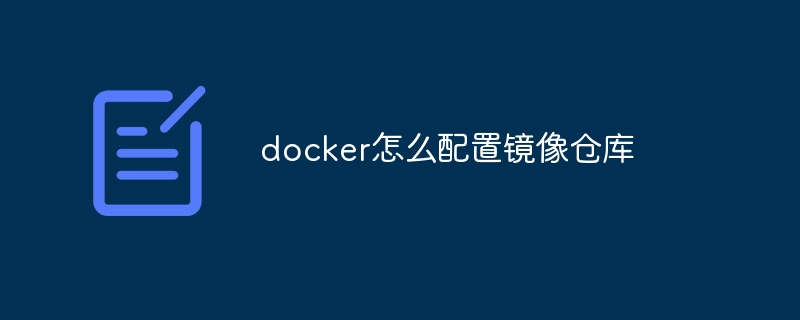How to configure the mirror repository of docker
Six key steps to configure Docker mirror warehouse: Select the mirror warehouse to create the warehouse authentication to the mirror warehouse push the mirror to the warehouse pull the mirror from the warehouse Configure the mirror warehouse credentials (optional)

How to configure Docker image repository
The Docker image repository is the central location for storing and managing Docker images. To configure a Docker image repository, follow these steps:
1. Select the mirror warehouse
- Docker Hub: Public image repository, stored by default on docker.io.
- Private mirror warehouse: Hosted at your own infrastructure or third-party service provider.
2. Create a repository
- Docker Hub: Create an account and create a repository directly on the Docker Hub website.
- Private image repository: Create a repository using the Docker Registry API or third-party tools such as Portainer or Harbor.
3. Authenticate to the mirror warehouse
- Docker Hub: Use the
docker logincommand to log in to Docker Hub. - Private mirror repository: Use appropriate authentication methods (such as OAuth2, username/password or certificate) depending on the mirror repository used.
4. Push the mirror to the repository
-
Use the
docker pushcommand to push the local image to the repository. The syntax is:<code>docker push <registry>/<repo>/<image>[:<tag>]</tag></image></repo></registry></code>
Copy after loginFor example:
<code>docker push docker.io/my-repo/my-image:latest</code>
Copy after login
5. Pull the mirror from the warehouse
-
Use the
docker pullcommand to pull the image from the repository. The syntax is:<code>docker pull <registry>/<repo>/<image>[:<tag>]</tag></image></repo></registry></code>
Copy after loginFor example:
<code>docker pull docker.io/library/nginx:latest</code>
Copy after login
6. Configure mirror repository credentials (optional)
- To avoid the need for authentication every time a mirror is pushed or pulled, you can configure the mirror repository credentials.
-
Add credentials in Docker client configuration (
~/.docker/config.json):<code class="json">{ "auths": { "<registry>": { "auth": "<base64 encoded username:password>" } } }</base64></registry></code>Copy after login
By completing these steps, the Docker image repository is successfully configured. This will allow you to store, manage, and share Docker images, simplifying deployment of containerized applications.
The above is the detailed content of How to configure the mirror repository of docker. For more information, please follow other related articles on the PHP Chinese website!

Hot AI Tools

Undresser.AI Undress
AI-powered app for creating realistic nude photos

AI Clothes Remover
Online AI tool for removing clothes from photos.

Undress AI Tool
Undress images for free

Clothoff.io
AI clothes remover

Video Face Swap
Swap faces in any video effortlessly with our completely free AI face swap tool!

Hot Article

Hot Tools

Notepad++7.3.1
Easy-to-use and free code editor

SublimeText3 Chinese version
Chinese version, very easy to use

Zend Studio 13.0.1
Powerful PHP integrated development environment

Dreamweaver CS6
Visual web development tools

SublimeText3 Mac version
God-level code editing software (SublimeText3)

Hot Topics
 How to exit the container by docker
Apr 15, 2025 pm 12:15 PM
How to exit the container by docker
Apr 15, 2025 pm 12:15 PM
Four ways to exit Docker container: Use Ctrl D in the container terminal Enter exit command in the container terminal Use docker stop <container_name> Command Use docker kill <container_name> command in the host terminal (force exit)
 How to copy files in docker to outside
Apr 15, 2025 pm 12:12 PM
How to copy files in docker to outside
Apr 15, 2025 pm 12:12 PM
Methods for copying files to external hosts in Docker: Use the docker cp command: Execute docker cp [Options] <Container Path> <Host Path>. Using data volumes: Create a directory on the host, and use the -v parameter to mount the directory into the container when creating the container to achieve bidirectional file synchronization.
 How to check the name of the docker container
Apr 15, 2025 pm 12:21 PM
How to check the name of the docker container
Apr 15, 2025 pm 12:21 PM
You can query the Docker container name by following the steps: List all containers (docker ps). Filter the container list (using the grep command). Gets the container name (located in the "NAMES" column).
 How to restart docker
Apr 15, 2025 pm 12:06 PM
How to restart docker
Apr 15, 2025 pm 12:06 PM
How to restart the Docker container: get the container ID (docker ps); stop the container (docker stop <container_id>); start the container (docker start <container_id>); verify that the restart is successful (docker ps). Other methods: Docker Compose (docker-compose restart) or Docker API (see Docker documentation).
 How to start mysql by docker
Apr 15, 2025 pm 12:09 PM
How to start mysql by docker
Apr 15, 2025 pm 12:09 PM
The process of starting MySQL in Docker consists of the following steps: Pull the MySQL image to create and start the container, set the root user password, and map the port verification connection Create the database and the user grants all permissions to the database
 How to update the image of docker
Apr 15, 2025 pm 12:03 PM
How to update the image of docker
Apr 15, 2025 pm 12:03 PM
The steps to update a Docker image are as follows: Pull the latest image tag New image Delete the old image for a specific tag (optional) Restart the container (if needed)
 How to create containers for docker
Apr 15, 2025 pm 12:18 PM
How to create containers for docker
Apr 15, 2025 pm 12:18 PM
Create a container in Docker: 1. Pull the image: docker pull [mirror name] 2. Create a container: docker run [Options] [mirror name] [Command] 3. Start the container: docker start [Container name]
 How to view the docker process
Apr 15, 2025 am 11:48 AM
How to view the docker process
Apr 15, 2025 am 11:48 AM
Docker process viewing method: 1. Docker CLI command: docker ps; 2. Systemd CLI command: systemctl status docker; 3. Docker Compose CLI command: docker-compose ps; 4. Process Explorer (Windows); 5. /proc directory (Linux).






